- Home
- William Shatner
Up Till Now
Up Till Now Read online
Up Till Now
Up Till Now
THE AUTOBIOGRAPHY
WILLIAM
SHATNER
WITH DAVID FISHER
THOMAS DUNNE BOOKS
St. Martin’s Press New York
THOMAS DUNNE BOOKS.
An imprint of St. Martin’s Press.
UP TILL NOW. Copyright © 2008 by William Shatner. All rights reserved. Printed in the United States of America. No part of this book may be used or reproduced in any manner whatsoever without written permission except in the case of brief quotations embodied in critical articles or reviews. For information, address St. Martin’s Press, 175 Fifth Avenue, New York, N.Y. 10010.
www.thomasdunnebooks.com
www.stmartins.com
Book design by Heather Saunders
Library of Congress Cataloging-in-Publication Data
Shatner, William.
Up till now : the autobiography / William Shatner with David Fisher.— 1st ed.
p. cm.
ISBN-13: 978-0-312-37265-1
ISBN-10: 0-312-37265-5
1. Shatner, William. 2. Actors—Canada—Biography. I. Fisher, David. II. Title.
PN2308.S52A3 2008
791.4502’8092—dc22
[B]
2008006234
First Edition: May 2008
10 9 8 7 6 5 4 3 2 1
I’ve written several books and many other things, and always cherished the dedication. In fact, one can riffle through my life based on the various people or, indeed, events that surrounded my time on this planet. But up to now, I have never acknowledged my father and my mother...my dear, hardworking, caring, loving dad, and my funny, frustrated, gentle mother. All that I am or might’ve been is their due. I bow with great humility in their direction.
ACKNOWLEDGMENTS
Without the love of my wife, Elizabeth, and daughters, Leslie, Lisbeth, and Melanie, there would be no book.
I’d would also like to acknowledge David Fisher, who turns out to be not only a wonderful writer and listener but a dear soul, as well. Blowing away some of the mists of memory, in his company, was an honor, as always.
And we would also like to express our gratitude to those members of the Shatner family and the many friends and associates who so willingly and enthusiastically gave their time and memories to help us create this personal portrait. We also deeply appreciate the efforts of our agent, Carmen La Via of the Fifi Oscard Agency; our publisher, Tom Dunne; our editor, Peter Joseph, and all of those truly supportive professionals at Thomas Dunne Books at St. Martin’s Press. This book would not have been possible without the work of Suzanne Copitzky and her staff at the Karmen Executive Center, and the hospitality of dear friends Eli and Noa Attia and George and Kathy Hicker.
David Fisher would simply like to express his love and his appreciation to his wife, Laura Stevens, who makes even the hard days wonderful.
Up Till Now
ONE
I was going to begin my autobiography this way:
Call me . . . Captain James T. Kirk or Sergeant T.J. Hooker or Denny Crane Denny Crane or Twilight Zone plane passenger Bob Wilson or the Big Giant Head or Henry V or the Priceline Negotiator or . . .
Well, that’s the problem, isn’t it? I’ve been a working actor for more than half a century and I’ve played so many different roles on the stage, on television, and in the movies that it would be impossible to focus on just one of them. Besides, my career as an actor is only part of my story, so I realized I couldn’t begin this book that way.
Then I decided I was going to start this book by telling the story of my memorable meeting with Koko the gorilla:
In 1988, to help the Gorilla Foundation encourage Californians to contribute to its Endangered Species Campaign, I was permitted to visit Koko the gorilla in her quarters. Koko was an extraordinary animal who had learned to communicate with human beings. She was able to sign more than six hundred words, but more impressively, as her handlers told me, she understood the meaning of those words. She knew the signs for water and for bird and the first time she saw a duck landing on a lake she signed water bird. That displayed a synthesis of knowledge. So you see, she was obviously very intelligent. I was allowed to go into her compound, to enter a room with her all alone. As I walked into that room I was reminded that she was an imposing, powerful animal; smaller gorillas have been known to tear off men’s arms in anger. I am not often afraid, but truthfully I was frightened.
There is a form of acting that teaches: feel it and say it, and that feeling will be revealed through your words. The English form is quite different: say it and then you feel it. To deal with my fear of this magnificent animal as I got closer and closer to her I found myself saying, “I love you, Koko. I love you.” I said it earnestly and honestly and I looked directly in her eyes as I spoke. I crouched over a little to show submission, moving forward rather than backward to show I was not afraid. Over and over I repeated, “I love you, Koko, I love you.” And as I said it, I began to feel that love. Finally I stopped directly in front of her and looked into her deep brown eyes and saw her furrowed brow and her enormous hands. I love you, Koko.
And with that she reached out and grabbed me by my balls. And looked me right in the eyes. After a slight pause—in a substantially higher voice—I tried to repeat, “I love you, Koko.” Obviously these words had more significance than a few seconds earlier.
Her handler, standing just outside the room, said, “Stand very still. She wants you to go to her bedroom.” So I stood very still because I did not want to go to her bedroom. I think it is fair to say that few people in history have ever stood as still as I did at that moment. Meanwhile, in the adjoining compound a young gorilla who they hoped would mate with Koko was pounding on the door like a jealous husband. There I was, caught in the eternal triangle, with a gorilla holding on to my rapidly shrinking scrotum. Eventually she got bored...
Starting this book with that story would enable me to inform the reader that it’s not going to be limited to my professional career, that it will also include stories about all the extraordinary opportunities I’ve been given to explore the world. I’d discuss all the amazing experiences I’ve had, from that dark night in Africa when I pursued a wild elephant to the afternoon a helicopter left me more alone than I’d ever been in my life on top of a twenty-thousand-foot-high glacier, and even to that memorable moment when I saw aliens in the desert. And it would also demonstrate that there are going to be a lot of laughs in this book, most of them at my expense. But then I realized that people know me primarily from the work I’ve done as an actor, so that wouldn’t be effective as a beginning. So I decided not to begin that way either.
Then I had a great idea. I was going to start the book by quoting the lyrics to a song I’d written about the truly tragic death by drowning of my beautiful wife, Nerine Shatner:
My love was supposed to protect her
It didn’t
My love was supposed to heal her
It didn’t
You had said don’t leave me
And I begged you not to leave me
We did
Opening the book that way would be so meaningful to me, beginning with the great tragedy of my life. And it would immediately let readers know that this is to be a truthful book. But it would also be such a sad beginning, when my life has been filled with so much joy. And of course, I’m not known for my singing; in fact there are those who believe my performance of “Lucy in the Sky with Diamonds” may be the worst version of a Beatles song ever recorded. Not me— of course. And this is such a personal story that it needs to be told in its entirety, so certainly I couldn’t begin my book that way.
There is one extremely well-known phrase that I definitely decided I
would not use to begin this book:
“Beam me up, Scotty.”
In fact, I am determined that this phrase will not appear anywhere in this book.
The beginning, I knew, needed to catch the interest of the reader within a few words, to engage their curiosity, to make them wonder, perhaps, what the hell is he talking about? Which led to:
I arrived in New York City for the first time in my life in an Indian outrigger canoe, having paddled all the way from Montreal...
I liked that, but it didn’t seem to convey the essence of my life. Somehow it seemed too gimmicky, too clever, so I knew I couldn’t use that. Maybe later in the first chapter, I decided.
It occurred to me that perhaps I should open this book with a description of the day I took my beautiful horse, Sultan’s Great Day, for his final walk in the pasture. Oh my, you should have seen him in his world-championship days. I’m telling you, this was the most magnificent stallion you’ve ever seen. I’m not kidding about that. Really, people were in awe of his presence. They would look at him and . . .
I would use that beginning to tell you about my passions, the passions that have made all the difference in my life. The passions that I’ve spent my life pursuing: the love of a beautiful woman, the love for my family, the love for my craft, my art, the need to experience every aspect of life. Sometimes I’m amazed to realize that I live today with the vestiges of my priorities as a young man, the desire to act, the need to be loved, the pleasures of a great meal, a great laugh, and enduring companionship.
But simply telling you about my passions—even my passion for horses and dogs—seemed far too somber an opening.
Perhaps, I thought, I should start this book by being glib, by exposing my quirky sense of humor to the readers. Make them laugh at the very beginning by quoting a newspaper story about one of the more unusual things I’ve ever done:
(AP) 1/17/2006 Actor William Shatner agreed on Monday to sell his kidney stone for $75,000 to an online casino. The money will go to Habitat for Humanity. “This takes organ donors to a new height, or perhaps a new low,” said Shatner. The auction price includes the surgical stent and string used to permit passage of the stone.
According to Shatner, the kidney stone was so big, “[Y]ou’d want to wear it on your finger. If you subjected it to extreme heat, it might turn out to be a diamond...”
While that beginning certainly would be humorous, it just seemed too frivolous to start that way. Instead, it occurred to me that the opening of this book should be thoughtful, it should be about my life. How much more sincere could I be about the life I’ve had than using words written by David E. Kelley for the character I play on Boston Legal, Denny Crane Denny Crane:
Evening: Crane and Shore on the balcony outside Crane’s office
CRANE
Alan Shore believes man has a soul. Stop the presses.
SHORE
Don’t you believe it? Can this be all there is? And if so... have we not wasted...
CRANE
I haven’t wasted a second. I’ve enjoyed my ride, all of it.
SHORE
But will it have truly counted for something?
CRANE
You’ve heard the old joke, Alan. Man shows up at the pearly gates, sees this guy in a pinstripe suit, briefcase, cigar, prancing about, he says to St. Peter, “Who the hell is that?” St. Peter says, “Oh that’s just God. Thinks he’s Denny Crane.”
SHORE
What would you do, Denny, if you actually met God one day?
CRANE
I dunno. Probably take him fishing.
For a brief time I had decided this was the perfect way to open this book. Then it occurred to me, let Denny Crane write his own book! Finally, inspiration struck! I had what I believed would be a unique and perfect opening:
Are you tired of paying full price for this book? Well, you don’t have to. You can buy as many copies of it as you like—and you name the price! That’s right, you name the price you want to pay. At Priceline.com it’s as simple as that. Here’s the way...
Opening this book like that would be funny, yet accurate, as many people know me from my work representing various companies, such as Priceline.com. And if we also could sell a few more copies of this book, well, I didn’t think St. Martin’s would object. And if Priceline was approached properly by my agent, perhaps they might even be willing to purchase the rights to the opening paragraph. For less than full price, of course.
But perhaps that was too crass for the opening of my autobiography, I decided. Is that really what I wanted to emphasize about my life and my career? And would Priceline meet my price? So that opening too, was rejected.
And then it occurred to me: I don’t need an opening. By the time you’ve reached this paragraph my autobiography has already started. Of course that was very similar to my career; I was already in the middle of it before I realized it had begun.
The first time I stood on a stage I made the audience cry.
Let me establish the rules for this book. I will tell all the jokes unless I specifically identify a straight line. In which case you will have the opportunity make up the jokes.
I was six years old, attending Rabin’s Camp, a summer camp for Jewish welfare cases run by my aunt in the mountains north of Montreal. I wanted to box at that camp—hitting people seemed like fun—but my aunt instead put me in a play named Winterset. My role was that of a young boy forced to leave his home because the Nazis were coming. In the climactic scene I had to say good-bye to my dog, knowing I probably would never see him again. My dog was played by another camper, costumed in painted newspaper. We performed the play on parents’ weekend to an audience consisting primarily of people who had escaped the Nazis, many of whom still had family members trapped in Hitler’s Europe. So many of them had left everything they knew or owned behind—and there I was, saying good-bye to my little doggie.
I cried, the audience cried, everybody cried. I remember taking my bow and seeing people wiping away their tears. I remember the warmth of my father holding me as people told him what a wonderful son he had. Just imagine the impact that had on a six-year-old child. I had the ability to move people to tears. And I could get approval.
Something in me always wanted to perform, always wanted the attention that came from pleasing an audience. Years before my camp debut my older sister remembers my mother taking the two of us downtown. Apparently I ran away and it took them several hectic minutes to find me—dancing happily in front of an organ-grinder.
Where did that come from? That need to please people? What part of me was born with the courage to stand in front of strangers and risk rejection? There was nothing at all like that in my family history. The Shatner family was Polish and Austrian and Hungarian, and apparently several of my forebears were rabbis and teachers. Like so many Jewish immigrants my father was in the schmatta business—he manufactured inexpensive men’s suits for French-Canadian clothing stores. Admiration Clothes. They were basically suits for workingmen who owned only one suit. Joseph Shatner was a stern but loving man, a hard-working man. I can close my eyes and remember the smell of his cutting room. The unforgettable aroma of raw serge and tweed in rolled-up bales, mixed with the smell of my father’s cigarettes. Saturday afternoon was the only time he would relax, lying on the couch and listening to New York’s Metropolitan Opera on the radio. He came to Montreal from Eastern Europe when he was fourteen, and worked selling newspapers and in other labor-intensive jobs. He started in the clothing business packing boxes and eventually became a salesman and finally started his own small company. He was the first member of his family to come to North America, but eventually he helped all ten of his brothers and sisters leave Europe. My friend Leonard Nimoy likes to joke about the fact that I never stop working; he does an imitation of me in which he says, “It’s quarter of four. What’s scheduled for four-ten? If I’m done there by four-thirty can we get something for four-fifty?”
Perhaps there is some truth to tha
t. Every actor has spent days . . . months staring at the telephone, willing it to ring. And living with the hollow fear that it might never ring again. Painting the walls over again while waiting for the next offer. After beginning my career I went more than twenty years without taking a real vacation, petrified I might miss a phone call. Having had that experience, having lived in the back of pickup trucks in the parking lots of summer theaters, indeed I am open to opportunities. But there is a general belief that I will accept almost anything that I’m offered and that certainly is not true. It was less than two years ago that I turned down an offer. Like any actor, I’m concerned about being over-exposed, so I’ve been very careful to limit myself to acting on the stage and in dramatic television programs, hosting documentary-type programs and game shows, appearing in movies and commercials, endorsing products, doing voice-overs, charity appearances, radio programs, Webcasts, videos, Star Trek conventions, game shows, horse shows and dog shows, writing books and songs, making albums, creating, directing and producing television programs, performing at concerts, and appearing on talk shows, competitive reality-type shows, and award programs. But that’s where I draw the line. For example, I rarely do bar mitzvahs and I’ve never worked in the Catskills.
My work ethic comes from my father. His dream was that I would eventually take over the business. So, as he had done, I worked in the factory packing suits. One of my skills is good packing. I know how to fold a suit with the shoulders touching inside-out, the sleeves down, folded flat so it stays pressed. I know the correct way to fold pants and put them in a box. Had I not become an actor I could have had a fine career in folding.
But acting? What did my father know from acting? Acting smacting, that wasn’t a thing real people did, it wasn’t a job. It wasn’t what people did to earn a living. It was playing.
From my father I learned the value of education, respect for others around me, and to be on time and prepared to work. Eleven-ohfive, he used to tell me, was not eleven o’clock. All my life I have been on time and prepared to work. I’ll tell you how deeply that ethic is ingrained in me. In 2007 I was invited by ABC to participate in a show entitled Fast Cars and Superstars, actually a NASCAR celebrity race. This was an opportunity to drive as fast as possible in an oval without having to worry about speed traps. A racetrack is the one place in the world you can drive as fast as your skills and your courage allow. This was my kind of TV show. I said, “Of course, I’d love to do it.” And then I began negotiating furiously for as much money as I could get.

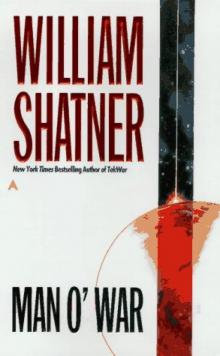 Man O' War
Man O' War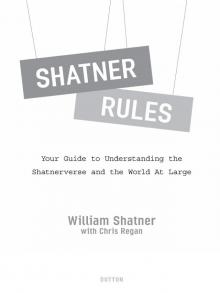 Shatner Rules
Shatner Rules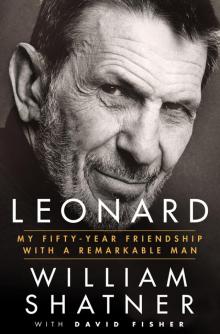 Leonard
Leonard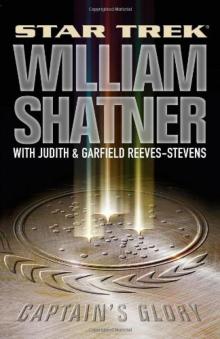 Captain's Glory
Captain's Glory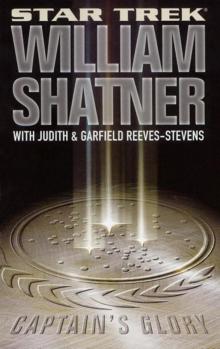 Captain's Glory зпвш-9
Captain's Glory зпвш-9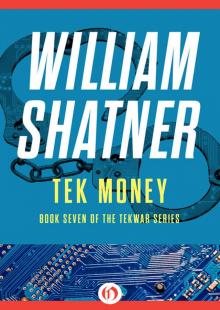 Tek Money
Tek Money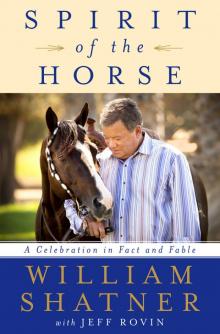 Spirit of the Horse
Spirit of the Horse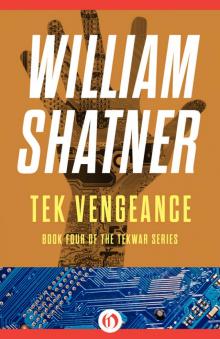 Tek Vengeance
Tek Vengeance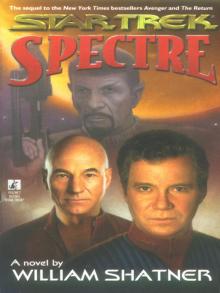 Spectre
Spectre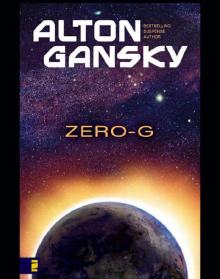 Zero-G
Zero-G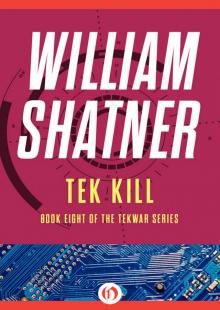 Tek Kill
Tek Kill Collision Course
Collision Course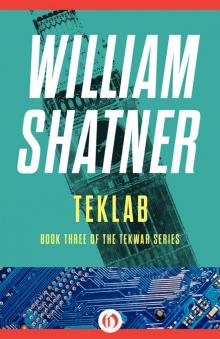 TekLab
TekLab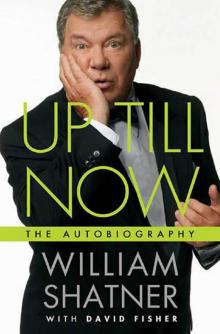 Up Till Now
Up Till Now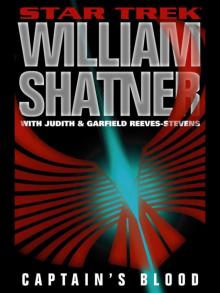 Captain's Blood
Captain's Blood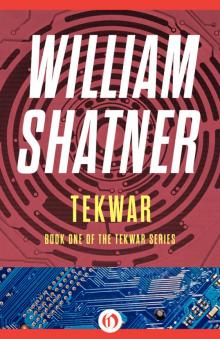 TekWar
TekWar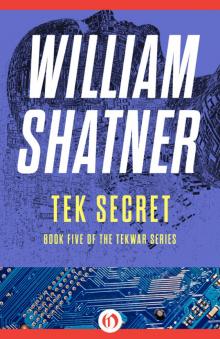 Tek Secret
Tek Secret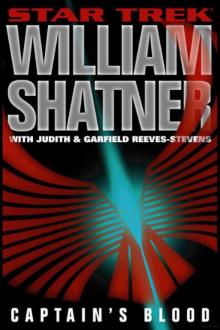 Captain's Blood зпвш-8
Captain's Blood зпвш-8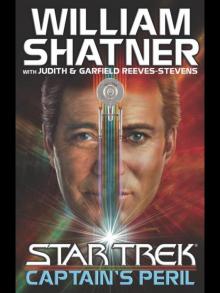 Captain's Peril
Captain's Peril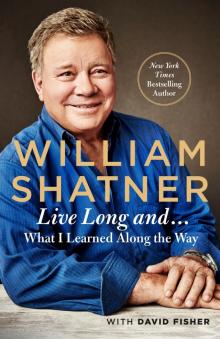 Live Long and . . .
Live Long and . . .